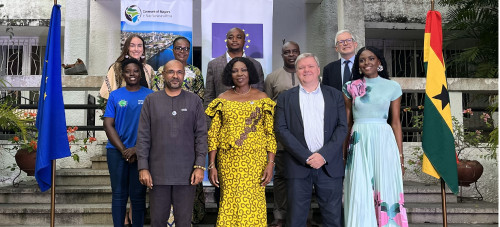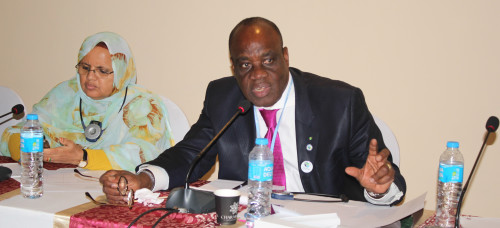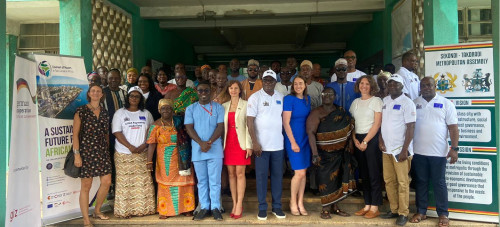Unlocking finance for climate change adaptation is key to building resilient African cities
Published: 8 Jul 2020


See the webinar session here
African cities are some of the most vulnerable to climate change in the world, and for them to become more resilient, significant funding is required to enable climate change adaptation.
However, Africa as a region has received the least climate change finance to date. Of the funds that are directed to African countries, very little flows to the city-level, where climate change impacts are felt most keenly, and most is allocated to climate change mitigation, not adaptation, despite adaptation being a major priority in Africa.
Adaptation finance: A core component of post-COVID-19 economic recovery, the second edition of our webinar series, presented by ICLEI Africa in partnership with the Covenant of Mayors in Sub-Saharan Africa (CoM SSA), focused on the barriers that African cities face in unlocking finance for climate change adaptation. Amidst the COVID-19 pandemic, resilience is key to municipalities recovering from a crisis of this scale. The webinar explored how African cities could unlock adaptation finance to ‘build back better’.
A high-level panel of city leaders and climate finance experts were invited to the table: Hon. Mayor Manuel Araújo of the City of Quelimane (Mozambique), and Hon. Mayor Mohamed Sefiani of Chefchaouen Municipality (Morocco), effectively representing the south-eastern and north-western corners of the African continent, discussed their cities’ climate adaptation projects and challenges. Carla Rooseboom (Director, GFA Climate & Infrastructure), and David Jackson (Director, Local Development Finance Practice, UN Capital Development Fund and co-chair of the LoCAL Board) offered perspectives on climate finance opportunities for African cities.
While the current pandemic is wreaking havoc on economies and cities’ infrastructures, it also offers the opportunity to re-think development plans that build resilience and incorporate climate change adaptation.
Mayor Araújo pointed to two major challenges: “first, the city of Quelimane is particularly vulnerable to the effects of climate change, specifically flooding and erosion, but that there is limited budget available. Second, the COVID-19 pandemic has resulted in the limited climate adaptation budget being reallocated to other sectors deemed to be in more urgent need of it. Access to quality and availability of human resources is a major challenge to accessing climate finance.”
Although the city has been proactive and launched many climate change adaptation projects, the challenges persist.
Mayor Mohamed Sefiani of Chefchaouen shares this concern, saying that there is a gap between good projects and concrete results. He highlighted that local governments were physically limited in their capability to access climate finance due to the inherent structure of these mechanisms. “Among the most dynamic and resourceful cities in Africa, not a single city had access to Green Climate Fund.” He added that local governments cannot develop good, air-tight projects to present to finance institutions alone, which is where city networks play an important role.
Carla Rooseboom, a financial analysis expert who contributed to CoM SSA’s upcoming study, Finance roadmaps for climate projects, argues that a centre of excellence in Sub-Saharan Africa with the capacity to develop funding proposals could simplify applications and processes. “There is a real need for an entity to sit between current funders and local government to translate what needs to be done and to support local governments to apply for and implement funding.”
David Jackson noted that cities are struggling to access the Green Climate Fund, as it does not accredit sub-national entities. The UNCDF’s Local Climate Adaptive Living Facility (LoCAL) is a mechanism that can bridge that gap: “LoCAL supports direct access to the Green Climate Fund for national government entities that channel funding directly to local government. Fifteen countries have joined and there are seven candidate countries to date.”
He also highlighted that climate finance generally sits with national government, and in order to unlock climate finance at the city level, multi-level government integration is needed. “It’s a mind-shift that national government needs to make to set their cities free. These are the conversations that we [at the UN] are having with central government. We have to change the dialogue to get their ear.”
In closing, Mayor Sefiani said that COVID-19 created a momentum to build resilience: “alongside local government, city networks and financiers can ensure that the recovery is inclusive.”
Dr Meggan Spires, Senior Manager for Climate Change, Energy & Resilience at ICLEI Africa, led the conversation, allowing the speakers to raise challenges and potential solutions. Reflecting on the outcomes, she commented: “I was struck by the rich discussion held today. Both Mayors conveyed the daily realities their cities face and described the pressure they feel to provide tangible solutions to their citizens, many of which are extremely vulnerable to the impacts of climate change. This was complemented by the technical experts’ input who gave experiential insights into how some of the seemingly insurmountable barriers to unlocking finance for climate change adaptation can be overcome. Our hope, at ICLEI Africa and CoM SSA, is that these conversations will continue, leading to the on-the-ground solutions that African citizens are so desperate for.”
Register for the next webinar here.





